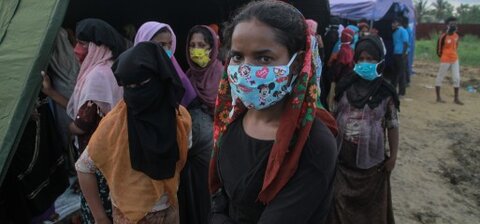Hawzah News Agency - (Aceh - Indonesia) - The UN Refugee Agency (UNHCR) welcomed the landing of approximately 300 Rohingya refugees on the northern coast of Aceh, Indonesia, after seven months at sea.
An unknown number of the refugees need medical attention after their ordeal, said the UNHCR.
Among the group, two of three are women and children, and more than 30 of them are estimated to have died during the voyage.
The UNHCR said around 330 Rohingya refugees were understood to have embarked on the journey from Cox’s Bazar, Bangladesh, in February.
“Their hazardous ordeal has been prolonged by the collective unwillingness of states to act for more than six months,” said the refugee agency.
It cited the Bali Process as the only existing regional coordination mechanism able to convene states on such maritime movements.
However, the process has failed to deliver comprehensive, regional action to predictably save lives through rescue and disembarkation, the organization added.
“The group had repeatedly tried to disembark over more than 200 days at sea, to no avail,
“Refugees have reported that dozens passed away throughout the journey.”
The UN agency said it and others have repeatedly warned of dire consequences if refugees at sea are not permitted to land safely and expediently.
“Ultimately, inaction over the past six months has been fatal,” said UNHCR.
The agency said its staff in Aceh are supporting local authorities to assess the needs of the refugees.
“The immediate priority is providing first aid and medical care as required. All will be tested for COVID-19 under standard health measures in Indonesia for all arrivals,” said the agency.
It added that at the time of the Andaman Sea and Bay of Bengal crisis five years ago, the Bali Process states acknowledged the need for a reliable and collective response to this genuinely regional challenge.
The Bali Process was launched in 2002 as a mechanism co-chaired by Australia and Indonesia to take life-saving action for refugees stranded at sea. Still, hundreds of Rohingya people died at sea in 2015 in the Andaman Sea and Bay of Bengal crisis despite the initiative.
“Having created a mechanism to convene governments from across the region for precisely this purpose, the promise of that commitment remains unfulfilled,” said UNHCR.
The Rohingya, described by the UN as the world’s most persecuted people, have faced heightened fears of attack since dozens were killed in communal violence in 2012.
According to Amnesty International, more than 750,000 Rohingya refugees, mostly women, and children fled Myanmar and crossed into Bangladesh after Myanmar forces launched a crackdown on the minority Muslim community in August 2017, pushing the number of persecuted people in Bangladesh above 1.2 million.

